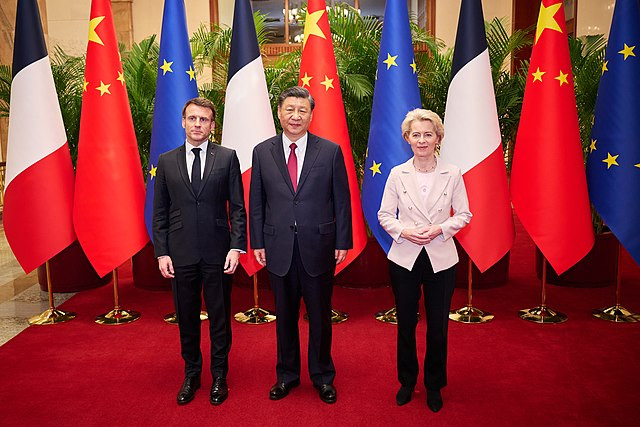French President Emmanuel Macron and European Commission President Ursula von der Leyen urged Chinese President Xi Jinping to address trade imbalances and ensure fair competition during talks in Paris on Monday, as part of Xi's first visit to Europe in five years. The discussions also focused on diplomatic efforts to convince Beijing to use its influence to move Russia toward ending the war in Ukraine.
At the start of the meeting, Macron emphasized the importance of developing balanced relations with China, stating, "The future of our continent will also very clearly depend on our capacity to further develop in a balanced way our relationship with China." Von der Leyen took a more direct approach, pointing out that the EU-China relationship is challenged by unequal market access and Chinese state subsidies.
Following the meeting, von der Leyen told reporters that the EU "cannot absorb massive over-production of Chinese industrial goods flooding its market" and that "Europe will not waver from making tough decisions needed to protect its market." This stance aligns with the U.S. approach, as U.S. Treasury Secretary Janet Yellen has warned China that Washington would not accept new industries being "decimated" by Chinese imports.
Xi, in his brief public comments, stated that he viewed relations with Europe as a priority of China's foreign policy and that both sides should remain committed to their partnership. "As the world enters a new period of turbulence and change, as two important forces in this world, China and Europe should adhere to the positioning of partners, adhere to dialogue and cooperation..." he said.
The EU's 27 members, particularly France and Germany, are not unified in their attitude towards China, which complicates efforts to achieve change. While Paris advocates for a tougher line on the electric vehicle probe, Berlin wants to proceed with more caution, as China is a key market for Germany's export-led economy and its carmakers.
French cognac makers, including Remy Cointreau, Pernod Ricard, and LVMH-owned Hennessey, are exposed to China's retaliatory anti-dumping investigation. French Finance Minister Bruno Le Maire stressed that France and China could legitimately support their domestic industries, but any such policies had to be fair and reciprocal.
France also hopes to push for the opening of the Chinese market for its agricultural exports and resolve issues surrounding the French cosmetic industry's concerns about intellectual property rights. China, in turn, may announce an order for around 50 Airbus aircraft during Xi's visit.
A key focus of the talks is to nudge China into pressuring Moscow to halt operations in Ukraine. Macron hopes to convince China to use its leverage with Russia to "contribute to a resolution of the conflict," according to a French presidential official. However, experts note that France's objectives are contradictory, as they seek to persuade Xi to pressure Putin to end the war while also discouraging China from delivering arms to Russia.
Several groups, including International Campaign for Tibet and France's Human Rights League, urged Macron to put human rights issues at the heart of his talks with Xi. Protesters demonstrated in Paris as Xi arrived on Sunday, calling for a free Tibet, and Amnesty International called on Macron to demand the release of imprisoned activists in China.
Xi's visit marks the 60th anniversary of France-China diplomatic relations and follows Macron's trip to China in April 2023. The discussions will be closely watched from Washington, as President Joe Biden is expected to pay his own state visit to France next month.
On the second day of the visit, Macron has invited Xi to visit the Tourmalet Pass in the Pyrenees mountains, where the French leader spent time as a child visiting his grandmother. This personal gesture is meant to reciprocate Xi's invitation to Macron last year to visit the residence of the governor of Guangdong province, where his father once lived.






